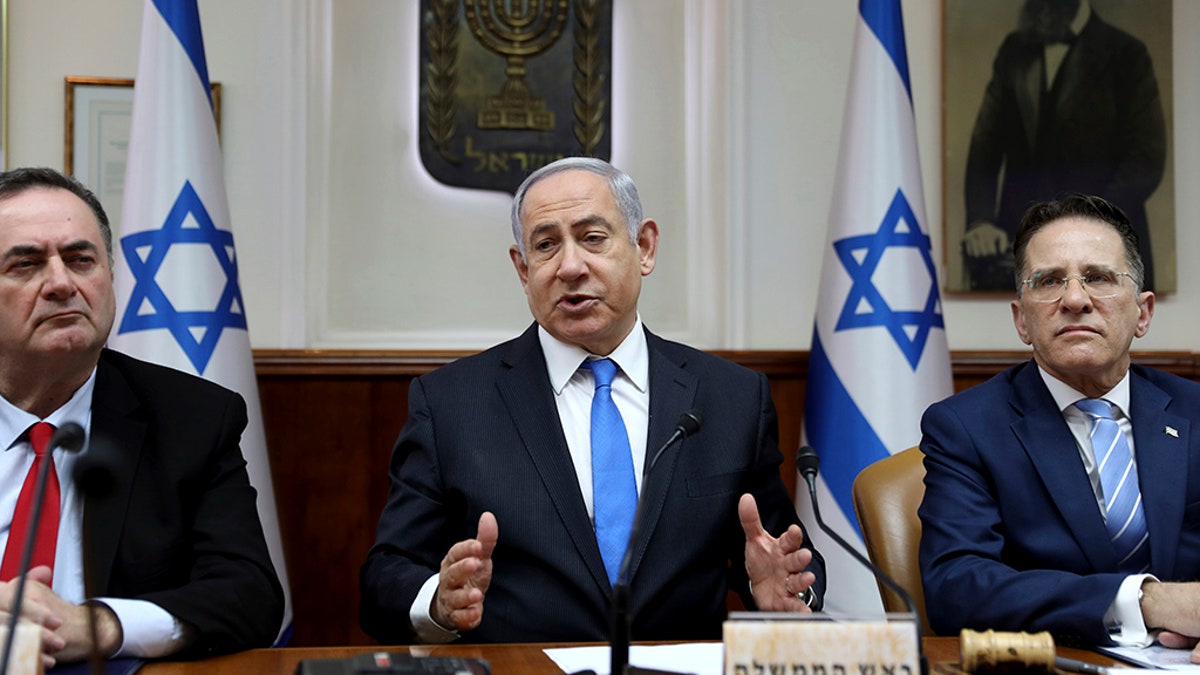Exit polls show Benjamin Netanyahu has edge in Israeli election, unclear if he can clinch majority
Israeli Prime Minister Benjamin Netanyahu of the Likud party is trying to hold off his main opponent Benny Gantz.
The Israeli prime minister’s request to delay the start of his corruption trial was rejected Tuesday.
Benjamin Netanyahu has been charged with fraud, breach of trust and accepting bribes in connection to a series of scandals that include accepting expensive gifts from wealthy friends and offering to exchange favors with powerful media moguls.
The long-ruling leader, who remained in power after last week’s national election, has denied any wrongdoing and said the crisis is the result of a media-orchestrated witch hunt to depose him.

Israeli Prime Minister Benjamin Netanyahu chairs the weekly cabinet meeting, in Jerusalem, Sunday, Feb. 16, 2020. (Gali Tibbon/Pool via AP)
NETANYAHU CLAIMS 'BIGGEST WIN' IN ISRAELI ELECTIONS, AS PARTIAL RESULTS SHOW SHORT OF MAJORITY
The case is set for trial on March 17. The presiding judge who overruled Netanyahu’s request said there was no justification for a delay because the first session was a procedural reading of the charges only.
Netanyahu’s lawyers had argued they needed more time to review evidence. Meanwhile, state prosecutors responded that they oppose any delays.
Amit Haddad, one of Netanyahu's lawyers, said he would seek a delay in the start of the trial. He said the request was “technical” and meant to give the defense time to review materials it still had not received.
Netanyahu, Israel’s longest-serving leader, is desperate to remain in office because installing a new government would give him an important political boost and potentially allow him to legislate his way out of the legal quagmire.
ISRAEL GOVERNMENT ORDER 14-DAY HOME QUARANTINE FOR OVERSEAS ARRIVALS
His opponent, Benny Gantz, refused to sit with him in government and appears poised to push for legislation in the incoming parliament that would bar anyone indicted for a crime from leading a government – in effect disqualifying Netanyahu from his position.
Meanwhile, Israel’s largely ceremonial president, Reuven Rivlin, urged the country’s opposing blocs to find a way to come together in the wake of the gridlock.
The president is responsible for choosing the prime minister-designate he thinks has the best chance of forming a stable government. Upon officially receiving the results of last week's vote, Rivlin said he was open to any proposal brought forward but made a point to suggest that his framework from the previous round of failed negotiations was still relevant.
CLICK HERE TO GET THE FOX NEWS APP
Rivlin, who will begin formal consultations with party leaders next week, took an active role in the previous round of talks and urged Prime Minister Benjamin Netanyahu's Likud party and challenger Benny Gantz's Blue and White party to join together in a unity government.
“I am certainly aware of the criticism of the outline that I presented then, and agree with much of it. But I did not believe there was another way and, even today, the situation has not changed a great deal,” he said in a statement after receiving the results.
The Associated Press contributed to this report.









































